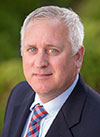
Jan. 18, 2023 – When Dodge County District Attorney Kurt Klomberg departed the office last week, he knew he would not be returning. After 12 years as Dodge County’s top prosecutor, Klomberg stepped down effective at 5:01 p.m. on Jan. 13.
“Regrettably, the current conditions in the office are untenable due to a projected loss of all working prosecution staff before the end of January 2023,” Klomberg noted in his resignation letter to Gov. Tony Evers in late December.
“I must place the interests of my family first, and remaining in my elected position is not reconcilable with their interests and needs,” noted Klomberg, a 20-year veteran prosecutor who will continue as an assistant district attorney in Green County.
As of yesterday (Jan. 17), there are no working state prosecutors in the Dodge County office, which has four designated assistant district attorney (ADA) positions.
There are two vacant positions, a third ADA is on family leave, and a fourth resigned effective yesterday. The office’s managing attorney is retiring on Feb. 1.
“There are some retired prosecutors who are doing some fill-in work in the interim, but they are part-time and limited,” Klomberg said.
The situation in Dodge County is not an isolated one. All across Wisconsin, prosecutor position vacancies are putting a crisis-level strain on the criminal justice system, says Klomberg, past president of the Wisconsin District Attorneys Association.
Combined with a
shortage of state public defenders, Wisconsin’s criminal justice system is at a breaking point, with widespread implications. But it didn’t happen overnight.
Criminal Justice Coalition
While prosecutors and public defenders are on opposite sides of the courtroom, their interests align when it comes to an efficient and effective criminal justice system.
 Joe Forward, Saint Louis Univ. School of Law 2010, is communications director for the State Bar of Wisconsin, Madison. He can be reached by
email or by phone at (608) 250-6161.
Joe Forward, Saint Louis Univ. School of Law 2010, is communications director for the State Bar of Wisconsin, Madison. He can be reached by
email or by phone at (608) 250-6161.
A Criminal Justice Coalition between the State Public Defender’s Office, the Wisconsin District Attorney’s Association, the Association of State Prosecutors, the Department of Justice, and the Director of State Court’s Office is an example of this alignment.
In the coalition’s
2023-25 biennial budget request, the criminal justice stakeholders noted that “the criminal justice system is made up of different actors with different fundamental roles and responsibilities but that are interrelated such that if one part of the system is under-resourced or inefficient, it impacts all others.”
The coalition also noted that its proposal accounts for less than 2% of state government spending. Meanwhile, Wisconsin has a
projected budget surplus of $6.6 billion.
“The prosecutors and the SPD have fallen victim to in the past of being pitted against each other,” Klomberg said. “And that's how the justice coalition was born.
“It was born out of that experience, saying, we've got to stop letting people pit us against each other. We may be adversaries, but we're not enemies, and we need to make sure that the whole system is healthy,” Klomberg noted.
Collaborating as a coalition, the coalition’s budget request notes that the major actors seek “investments that are critical to ensure that Wisconsin meets its constitutional obligations to all citizens impacted by the justice system.”
Prosecutor Pay
While the current prosecutor crisis has blossomed the past year, Klomberg says this problem has taken root over the last two decades. “This is a historical problem that didn't happen overnight,” Klomberg said. “There has been a long-term neglect. The program has had a whole plethora of issues that needed addressing.”
“There's only a handful of us with 15 to 20 years of experience and that was OK for a while,” Klomberg said. “But then we're seeing all these massive retirements.
“We knew that our retirements were coming for long time prosecutors, which created a need for us to fill these positions. That's occurring all over the state.”
Some incremental changes have occurred in the last 10 years, including a 17-step, merit-based pay progression system to retain experienced prosecutors. But that system has
not been fully funded in subsequent budgets. “We had a revolving door for a long time in the sub-five year category, and we are reeling from that now,” he said.
Klomberg said the first step in achieving a healthy criminal justice system, from the prosecutors’ perspective, is to raise the starting wage for prosecutors. That will help DA offices fill vacant positions throughout the state and address major backlogs that are already happening, which irks judges anxious to move their dockets along.
“That is absolutely critical right now,” said Klomberg, noting that the starting prosecutor pay lags far behind other government lawyer positions and DA offices are struggling to attract and retain young prosecutors facing law school debt and cost-of-living increases.
The starting pay for prosecutors in Wisconsin is currently $56,659. The coalition’s budget request asks for a starting pay increase to $72,800 ($35 per hour).
“This request comes as our state faces a statewide crisis in our criminal justice system that is due, in part, to a lack of prosecutors across all counties,” notes the coalition’s budget request, which also calls for a market-based increase for all prosecutors.
Currently, there are 29 assistant district attorney positions posted on
wisc.jobs, but some of them are posted for multiple positions. Klomberg said other counties may only post for one position when multiple positions are available.
“The plan in this budget is to address the base pay so that we can get more recruits,” Klomberg said. “At $56,000 per year, a new prosecutor cannot pay back loans, let alone buy a house or raise a family. So they come in, get trial experience, and leave for more lucrative positions. You cannot get better training trial-wise than in the DA’s office.”
But compensation is only half the battle, Klomberg said. Some 20 years ago, when he started out, new lawyers wanted to be prosecutors.
“Throughout the media and, I'm afraid, even in some of the training grounds, there is a fair amount of disparagement for this business.”
Klomberg said the bigger picture of changing the view on the desire to become a prosecutor is a larger societal issue that cannot be fixed through the state budget.
“But the legislature has the ability, right now, to help us attract the people that want to do this work but just can't afford to do it,” he said. “It was the lack of applicants that caused the cascade failure here in Dodge County.”
In this employee market, Klomberg also says, DA offices need more to sell candidates. “Instead of candidates selling themselves to us, we are trying to sell the office to them. That’s completely on its head from two decades ago,” Klomberg said.
State Public Defenders
The state public defender’s struggles have been well-documented in the last decade, from a
shortage of public defenders to the
pay rate for private bar attorneys appointed on overflow and conflict cases that the state public defender’s office cannot handle.
The state public defender, in the coalition’s 2023-25 budget request, is seeking an increase for first-year public defenders, from $55,536 per year to $72,800 per year. Like the prosecutors, the public defenders also seek proper funding for pay progression.
“[O]ffering a starting salary that is more in line with similar agencies regionally and nationally will increase the ability to hire for vacant positions,” the request states. “This reduces delays in cases moving forward.”
In the 2019-21 budget, the legislature
increased the private bar rate for SPD appointed cases from $40 per hour – the lowest rate in the country at the time – to $70.
But inflation has quickly eroded the incentive of a $30 increase to take those cases. In addition, attorneys appointed at county expense are paid $100 per hour.
“This, coupled with the pandemic and workload impact on private bar attorneys, has significantly decreased the number of certified private bar attorneys and the number of cases that they will accept,” the coalition’s budget request states.
The coalition is asking the legislature to increase the private bar rate for SPD-appointed cases from $70 to $125 for in-court work, $100 per hour for out-of-court work, and raise the travel rate from $25 per hour to $50 per hour.
"The importance of having a defense attorney involved in a case as early as possible can't be overstated,” said State Public Defender Kelli Thompson.
“A lack of adequate compensation and excessive workload harms clients, public safety, and everyone counting on the justice system to live up to its constitutional ideals."
Public defender pay is a crucial piece of the criminal justice puzzle, Klomberg notes. “This is a criminal justice system problem. Despite philosophical differences between prosecutors and public defenders, it's really important that both systems are healthy,” he said.
